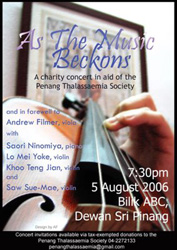Recently I came across two blog postings that dealt indirectly with the idea of how one generation imparts values to the next.
One was Marina Mahathir’s Merdeka Day blog posting, entitled Communing Over Cupcakes. She mentions that she had put her child in a national school here in Malaysia, which ended up creating a contradiction of values: her daughter came home with “racial-toned language” and Marina noted that “obviously she was being indoctrinated every day with the idea of racial superiority of only one community, hers.” She ended up moving her daughter to a private school after only eight months.
The other was of a response of a librarian who politely refused a parent’s insistence to censor the contents of his library, specifically a children’s text that included the character of a gay uncle. While putting out various reasons why a library has to be neutral to ideology in being a source of information, he noted that the child in question had returned to her mother saying that the book’s perspective was wrong. This, according to the librarian, thus indicated that a library does not have the ability to override a parent’s choice of values to impart to her child, stating that, "In other words, you have taught her your values, and those values have taken hold. That's what parents are supposed to do..."
My question: is it though?
There are quite a number of things which are illegal but hardly immoral. In a Malaysian context consider “illegal gatherings” – which under the Internal Security Act can be any group of three people and above without a police permit – versus the concepts of freedom of expression, association and dissent. Or a far simpler example: pirated DVDs (for non-Malaysian readers it would be good to point out that predatory film companies place the price of a bona fide DVD around eight times the price of a movie ticket, or enough to buy you lunch and dinner for a week). But there are probably far more things which are legal but unethical, including racist, sexist or otherwise bigoted thinking. So long as one doesn’t act too blatantly based on a discriminatory platform, one gets away with it – and if Malaysian politics has shown anything, it’s that one can get away with it even if it is blatant. But in a larger, more international context, Mel Gibson or Isaiah Washington can be bigots in their private life, and the line to cross is when those worldviews are put into destructive action.
For some reason, we don’t consider it crossing the line when these views are put into the heads of children in the home, because of the right of the parents to choose values for their children. So it’s bad behaviour to impart anti-Semitism to a cop who has pulled you over, but alright to plant those same ideas into one’s kids?
Even the best parenting does not always guarantee kids will turn out well, and the picture looks bleak with bad parenting. Sometimes I’m relieved when kids end up with a set of perspectives different from their folks – not because the older generation is wrong, but just to know that beyond individual ideologies, those of the new generation can think for themselves. Which is, incidentally, on occasion is thanks to parents who place independence of the thought over subscription to their own ideology. There’s nothing inherently wrong with Democratic kids from Democratic parents or Republican kids from Republican parents, but if one ticks the ballot box in one spot simply as family tradition, then one throws out the value of democracy. The best parenting is when parents teach their kids the value of voting rather than which party for which to vote.
I used to think that whatever the upbringing, the dawn of one’s age of reasoning, whether it be an arbitrary date like that of 18 or 21 or a rite of passage like the walkabout of the Australian aborigines, determines when one is responsible to think for oneself. But then things happen like young adults – even young parents – who become suicide bombers on public buses, or children in the African who are indoctrinated into becoming killing machines. Which makes me think that in the right rotten environment, one can be robbed of the ability to reason, to think.
Some cases are easily seen as flawed, like the case highlighted by Ellen Degeneres of the young boy who killed his gay classmate because he asked him to be his Valentine. But there are cases which are for the most part accepted in our society without much second thought – like extremely young girls dressed in complete Muslim garb. Cultural or religious integrity is one thing (and I have more Muslims in my extended family than non-Muslims) but can a 9-year old really understand that she’s covered up for a sense of modesty? Is there really that much harm in letting your neighbours know that you have a beautiful child? And Christianity is not without matters which people take for granted. First communion for Catholics, which is given out to those in Standard 3 – which, if my math is correct, also makes them 9 years of age – revolves around one of the toughest concepts of the faith which some adults aren’t completely clear about: transubstantiation.
That being said, in the end, tudungs and communion wafers are likely to do more good than harm in the sense that it is but one aspect of a shared community. The problem is that it’s hard to tell where the boundary is that so often goes trodden unnoticed… when a common cultural identity turns into when schoolchildren are either told that Catholics are better than Protestants, or that Muslims are better than Christians. There is no mechanism to ensure that either parents or institutions are kept in check – as seen by the pro-censorship mother or the national school Marina mentioned.
But with at least one open and progressive mind – whether it be a parent who notes racism creeping into her child’s life or a librarian who keeps knowledge free of bigotry, the next generation might just have a fighting chance.
Friday, September 05, 2008
Subscribe to:
Post Comments (Atom)






No comments:
Post a Comment